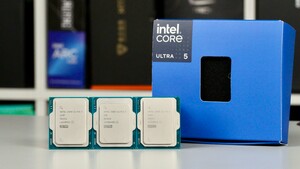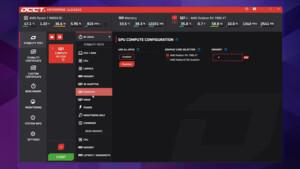ABT (Adaptive Boost) würde ich auslassen, damit verlierst du jegliche Effizienz des 11900K, die eh schon knapp ist.
Der 11900K wurde über das normale Limit getrieben, welches mit diesen Strukturbreiten sinnvoll gewesen wäre. Die Fertigungstechnik, die hier zum Einsatz kommt, fühlt sich am Wohlsten in den mittleren 4 GHz-Bereichen. Daran sieht man schon, dass der 11900K wirklich ein extremes Modell ist, für das stark gebinnt werden muss. Beim 10900K ging es ja vorher so weit, dass man den 10850K nachgeschoben hat, weil viel zu wenige CPUs das Binning für den 10900K bestanden hatten.
ABT wurde für den 11900K zwei Wochen vor Launch (!) noch schnell aus dem Boden gestampft, um noch irgendwie die Performancekrone zu bekommen, vor allem für's Gaming. AMD hat halt mittlerweile so starke CPUs im Angebot, dass Intel nicht nur keine Reserve lassen konnte wie früher, sondern sie gingen nun so weit, dass es einem Werks-Overclocking gleichkommt.
Du musst nur mal diverse Reviews lesen, in denen ABT getestet wurde. Die Leistungsaufnahme steigt enorm an, für einen lächerlich geringen Performancezuwachs. Das ist das, was ich sagte mit der Fertigungstechnik. Jede Technik hat ihren "Sweet Spot" bei dem Spannung-vs.-Frequenz-Mapping oder salopp gesagt der Spannungskurve. Man kann sehen, wie komfortabel eine Technik mit einer gewissen Frequenz läuft, indem man schaut, wieviel VCore dafür benötigt wird. Wenn man das auf einer Kurve festhält, wird diese Kurve ab einer gewissen Frequenz immer steiler ansteigen. Das ist bei Rocket Lake noch vor 5 GHz. Jetzt will man aber mit ABT noch mehr boosten, und was passiert? Man ist auf der Spannungskurve im Bereich, wo die Kurve exponentiell ansteigt, aber man erreicht ja nur minimal höhere Frequenzen -> die Berechnungseffizienz geht zum Teufel. Weder OC noch ABT macht Sinn bei so einer CPU.
https://www.guru3d.com/articles_pages/intel_core_i9_11900k_processor_review,31.html
"As always we tried to overclock the processor. It certainly is doable but we're not sure if it is desired; proper liquid cooling is a must with this processor series. We got the processor stable at 5200 MHz all-core. 5300 MHz would boot fine, however created too many stability issues. At that point, we'd pass 1.5 Volts on the CPU. The heat production is significant. Realistically I'd say, leave tweaking for what it is as the defaults of these processors are already really close towards these performance regions.
5100 MHz all core yields 380W power consumption (system / GPU inactive)
5200 MHz all core yields 410W power consumption (system / GPU inactive)"
https://hexus.net/tech/reviews/cpu/147440-intel-core-i9-11900k/?page=14
"Rocket Lake-S requires plenty of juice at the MCE-optimised frequencies run for the benchmarks on the previous pages. Overclocking by running the highest all-core speed at a set 1.4V gave us a final frequency of 5.1GHz, which is lower than what the chip boosts to on fewer cores.
You may ask the question as to why bother? This all-core 5.1GHz speed is the same as the supposed frequency the chip runs at with Adaptive Boost Technology enabled, while CPU-only power consumption rises to around 300W and puts our impressive Noctua cooler under tremendous pressure. The differences are minor, insofar as manually overclocking guarantees the frequency is applied at all times, not just when ambient conditions are correct.
Running all-core this way, the low-load PiFast result is actually slower.
Multi-thread benchmarks show a small gain in performance, intimating it's not really worth overclocking as one increases the chances of failure without a decent reduction in rendering time."
https://www.kitguru.net/components/cpu/leo-waldock/intel-core-i9-11900k-review/8/
"The real jaw-dropper comes when you enable Adaptive Boost and watch the all-core speed push to 5.0GHz or 5.1GHz. The bad news is the five or six percent increase in clock speed requires 25 percent more power. These figures suggest that Intel has felt obliged to push way beyond the point of efficiency in a desperate scramble for clock speed and performance."
https://www.thefpsreview.com/2021/03/30/intel-core-i9-11900k-cpu-review/12/#ftoc-heading-38
"Turning on Adaptive Boost increases the CPU Package Power by a whopping 28%. Now, we in no way shape, or form saw a 28% uplift in performance. Therefore the power demand for the small percentage in performance we got across the board in our benchmarks is completely and wholly inefficient, and just quite insane to be honest."



